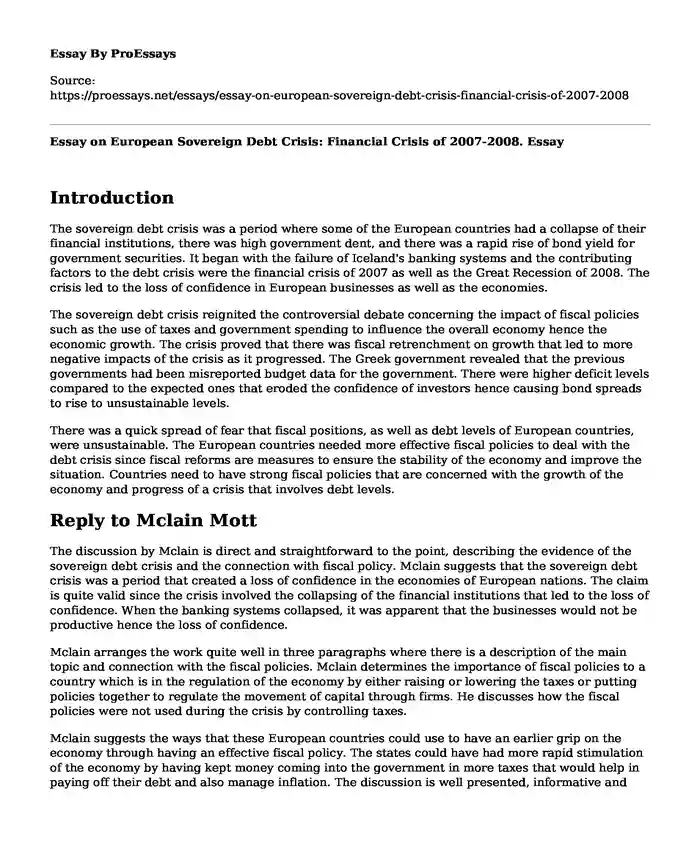Introduction
The sovereign debt crisis was a period where some of the European countries had a collapse of their financial institutions, there was high government dent, and there was a rapid rise of bond yield for government securities. It began with the failure of Iceland's banking systems and the contributing factors to the debt crisis were the financial crisis of 2007 as well as the Great Recession of 2008. The crisis led to the loss of confidence in European businesses as well as the economies.
The sovereign debt crisis reignited the controversial debate concerning the impact of fiscal policies such as the use of taxes and government spending to influence the overall economy hence the economic growth. The crisis proved that there was fiscal retrenchment on growth that led to more negative impacts of the crisis as it progressed. The Greek government revealed that the previous governments had been misreported budget data for the government. There were higher deficit levels compared to the expected ones that eroded the confidence of investors hence causing bond spreads to rise to unsustainable levels.
There was a quick spread of fear that fiscal positions, as well as debt levels of European countries, were unsustainable. The European countries needed more effective fiscal policies to deal with the debt crisis since fiscal reforms are measures to ensure the stability of the economy and improve the situation. Countries need to have strong fiscal policies that are concerned with the growth of the economy and progress of a crisis that involves debt levels.
Reply to Mclain Mott
The discussion by Mclain is direct and straightforward to the point, describing the evidence of the sovereign debt crisis and the connection with fiscal policy. Mclain suggests that the sovereign debt crisis was a period that created a loss of confidence in the economies of European nations. The claim is quite valid since the crisis involved the collapsing of the financial institutions that led to the loss of confidence. When the banking systems collapsed, it was apparent that the businesses would not be productive hence the loss of confidence.
Mclain arranges the work quite well in three paragraphs where there is a description of the main topic and connection with the fiscal policies. Mclain determines the importance of fiscal policies to a country which is in the regulation of the economy by either raising or lowering the taxes or putting policies together to regulate the movement of capital through firms. He discusses how the fiscal policies were not used during the crisis by controlling taxes.
Mclain suggests the ways that these European countries could use to have an earlier grip on the economy through having an effective fiscal policy. The states could have had more rapid stimulation of the economy by having kept money coming into the government in more taxes that would help in paying off their debt and also manage inflation. The discussion is well presented, informative and easy to understand for everyone. Mclain makes it easy to comprehend everything about the sovereign debt crisis for European countries, even with the small explanation presented.
Cite this page
Essay on European Sovereign Debt Crisis: Financial Crisis of 2007-2008.. (2023, May 21). Retrieved from https://proessays.net/essays/essay-on-european-sovereign-debt-crisis-financial-crisis-of-2007-2008
If you are the original author of this essay and no longer wish to have it published on the ProEssays website, please click below to request its removal:
- Is Going to College Worth It? - Essay Sample
- Risk Assessment Audit in Banks Paper Example
- Essay Sample on the Pay Model Strategy: The Totality of Decisions
- Globalization: New Exclusion Amidst Growing Inequality - Research Paper
- Research Paper on Taxation: The Unavoidable Levy of Governments
- Crisis Comm: Traditional Models, Social Media, & Current Challenges - Essay Sample
- Essay Example on Amazon Stock: Rapid Increase Amidst Covid-19







